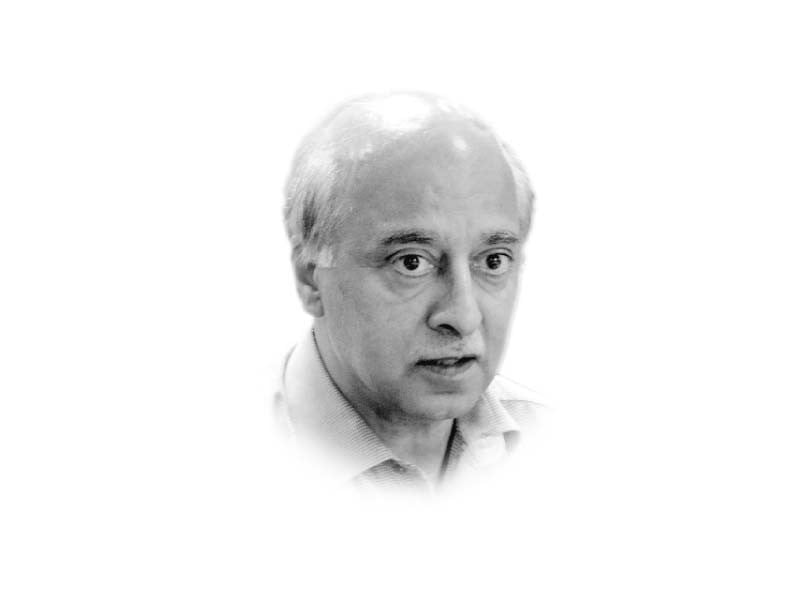
The recent ordeal of Amjad Shoaib, an 80-year-old decorated veteran of Pakistan’s armed forces, marked another low in Pakistan’s chequered politics. It symbolises an administrative tactic that apparently knows no compassion, tramples citizens’ fundamental rights and is bereft of any moral scruples whatsoever.
Dozens of cases against former prime minister Imran Khan and his colleagues reflect the parochial, petty political and bureaucratic mindset ruling Pakistan. Everybody wonders how a former PM all of a sudden turned into a criminal, terrorist and a rebel.
Will brazed March 5 ban on Khan’s speeches orders by PEMRA followed by the shutdown of a TV news channel neutralise Khan?
All bans against Imran Khan, in the words of advocate Faisal Zaman, have only worked in his favour and against his opponents. The reality is, he says, that Khan is news or else there’s no news. All speeches of opposition mention only Khan. Courts won’t allow blanket prohibition as it violates fundamental rights.
Contrast this with the next-door India. A country we have been told since childhood needs to be “crushed” has galloped its way up in a phenomenal way. It is reaping dividends of a resolute foreign policy – recalibrated around year 2000 – like never before.
Two cases illustrate this proliferation of influence – the recent G-20 summit in India, and a meeting between the National Security Advisors of the United States and India at the inaugural meeting of the initiative on Critical and Emerging Technology (iCET) in Washington DC (Jan 31).
A statement after the huddle said: “The United States and India affirm that the ways in which technology is designed, developed, governed, and used should be shaped by our shared democratic values and respect for universal human rights. We are committed to fostering an open, accessible, and secure technology ecosystem, based on mutual trust and confidence, that will reinforce our democratic values and democratic institutions.”
The inaugural meeting was the literal first step towards translating the announcement that Biden and Modi made during their meeting in May 2022. Objective: to elevate and expand strategic technology partnership and defence industrial cooperation between the governments, businesses and academic institutions of the two countries.
See who participated from both sides – the US Administrator of the National Aeronautics and Space Administration, the Executive Secretary of the National Space Council, senior officials from the Department of State, Commerce, Defense and the National Security Council. From the Indian side, the Ambassador to the United States, the Principal Scientific Advisor to the Government of India, the Chairman of the Indian Space Research Organization and senior officials from the Ministry of Electronics and Information Technology and the National Security Council Secretariat participated.
Former US President Bill Clinton laid the foundations of the present US-India relationship in March 2000. It rose to new levels in 2006 when both nations signed the civil nuclear technology cooperation deal.
India has since assumed an unmatched place in the Indo-Pacific policy of the United States through multiple bilateral and multilateral partnerships such as Quadrilateral Security Dialogue (QUAD), Eurasian Economic Union (EAEU), Asia-Europe Meeting (ASEM), BRICS and OIC (observer status).
Where is Pakistan? Is it relevant to the rest of the world anymore?
The slew of sedition cases and arrests of opposition leaders and journalists critical of the present system prompts one to wonder if Pakistan is in the reverse gear to the brutal 1970s/1980s of pro-US military dictatorships marked by arrests, illegal detentions, torture and muzzling of media and opposition.
Sedition and terrorism cases against Imran Khan, Sheikh Rasheed, Fawad Chaudhry, Azam Swati, journalists Arshad Sharif and Imran Riaz inter alia are some of the cases in point.
Shandana Gulzar, one of the most articulate leaders of PTI, is meanwhile also part of the “hall of fame” that includes all those accused of sedition, hate-speech and anarchy. Shandana had made some critical remarks to the context of the Peshawar Police Lines Mosque tragedy during a TV show.
Amjad Shoaib faced similar charges, went through public humiliation before being “honourably” acquitted.
Almost all – Human Rights Commission of Pakistan (HRCP), Human Rights Watch, Reporters Sans Frontieres, Amnesty International, Federal Union of Journalists, US State/Justice Departments – hardly took any public position on the post March 2022 events in Pakistan.
Both the HRCP and the Amnesty International finally woke up after the mentioned TV news channel was put off-air.
“Criticism of state institutions cannot be considered hate speech as has been suggested by PEMRA. Any limitations on the right to freedom of expression must be on a case-to-case basis and deemed to be necessary and proportionate conforming to international human rights laws and standards,” reminded a statement by Amnesty International on March 6.
Probably, political expedience, geopolitical compulsions and commercial considerations have muzzled most defenders of human rights and freedom of speech – both inside Pakistan and abroad. Are we dealing with a theatre that is deafened, dumbed and blinded by aforementioned factors?
Published in The Express Tribune, March 14th, 2023.
Like Opinion & Editorial on Facebook, follow @ETOpEd on Twitter to receive all updates on all our daily pieces.













COMMENTS (1)
Comments are moderated and generally will be posted if they are on-topic and not abusive.
For more information, please see our Comments FAQ